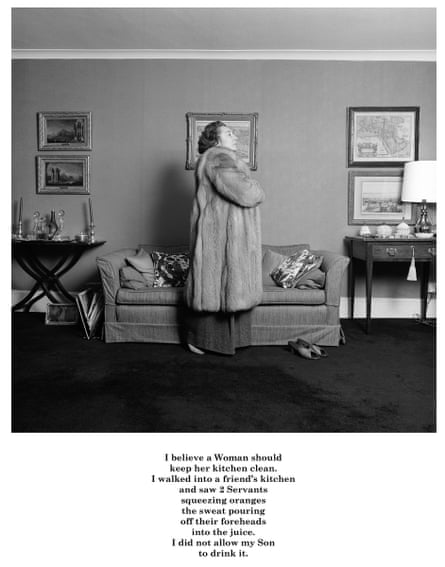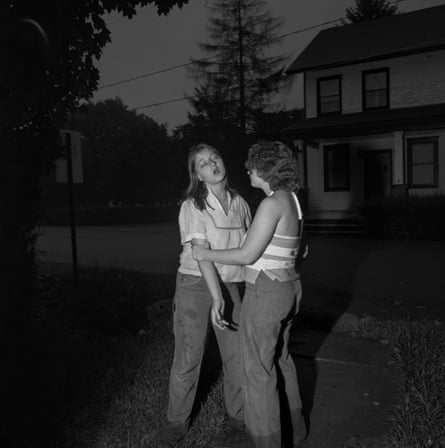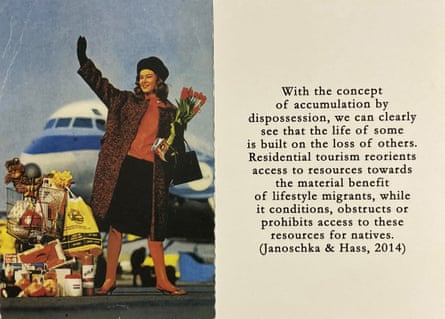 |
|
‘No poor person decides how they get photographed’
Guy Lane
Monday 24 July 2023
The theme of this year’s Cortona on the Move festival, held annually in Tuscany, is More or Less, and the way in which those two categories can be used to understand ourselves and our world.
Across 26 exhibitions, documentary photographers explore the contrasts between wealth and poverty, abundance and scarcity, and the marginal and the mainstream.
Below, photographer and festival artistic director Paolo Woods explains his theme.
“I’ve always been very interested in why documentary photography has been so fascinated by poverty, and has so much forgotten wealth, the well-heeled and the rich; and why most of the images of the rich were commercial, celebratory, advertising, or just pure portraiture – but always made on the terms of the sitters,” he said.
“Secondly, I think today, with the press melting like snow under the sun, the role of the festival is not only to show good work but to say something.
“So much of what is produced in photography today is focusing on the inner, focusing on the intimate, focusing on what you feel, focusing on the personal at the expense of the political.
“Photography is an incredible instrument for exploring the self, but it can’t only be about the self; it has to address a larger community and the conditions of the world we live in – what you could call political work.

Uzi Lvke, the stage name of Luca Sampieri, an Italian rapper, photographed in Corviale, a residential complex on Rome’s south-western outskirts. The photograph features in Marco Garofalo’s Ultima Chance exhibition.
“If we go back to the old distinction where we divide photography into windows and mirrors, I do feel there are now a lot of mirrors, and the windows all tend to show the same thing. But I also feel there is a lot of work that deserves to be shown that deals with the world we’re in.
“In a year where we saw inflation galloping, and we see statistics about inequality, especially after the pandemic, skyrocketing, I thought we can’t escape this. I want to speak about wealth and poverty.
“This cleavage between more and less is a way you could look at the world. It’s a filter through which you can look at not only issues about the economy and wealth, but other issues too.
“It’s about who we are. And it’s also about, obviously, the wealthy and how they portray themselves, and how we portray them, and how we imagine them. It’s not that the wealthy are underrepresented; they may be overrepresented, but on their terms.

Firenze by Massimo Vitali. For Woods, ‘Vitali is 100% documentary. He tells us something about the world we live in. It’s not photojournalism, it’s just one of the dialects of the language of photography.’
“A poor person doesn’t have a press secretary, a PR person, dogs and barriers and villas with alarms. No poor person decides how they get photographed.
“Now when you photograph somebody important, you first speak with somebody in between who tells you what kind of image you can make, who looks at the image to decide how much retouching there is going to be, and who then decides what you can do with it. We’re not even close to journalism; we’re close to hagiography.
“It’s not only about the rich, it’s about how you portray things. We are used to a kind of photography, and we see the kind of images already in our minds before they are taken.

A full moon yoga session in Dubai, from Nick Hannes’s Garden of Earthly Delights series
“I’ve tried to go a bit beyond that cliche and say wealth and poverty, but not only those issues, can be portrayed in different ways. And wealth and poverty can be found in Europe, or Africa, South America, the US or anywhere else.
“I’m looking for work that will speak to me from completely new perspectives about the world that surrounds us. It can start from something personal, but become much more general, and speak to many more people. A few years back you would have had a hard time defining that as documentary photography.”
Five to see …

Lara, 29, works as a makeup adviser at a cosmetics store in Argentina.
Irina Werning’s How to Survive Inflation from a Pro consists of deadpan set pieces making wry comments on Argentina’s decades of double-digit inflation.
Makeup adviser and trade union delegate Lara, for example, poses with banknotes representing one month’s salary plus earnings from her freelance modelling jobs.
For Woods, “Werning comes at it from an economist’s point of view and tells you what is the system and what lies behind it. She makes photo illustrations that are explanations.”

VIP reception with finger food at a Swedish stand at a defence fair in Kielce, Poland, in 2016.
Nikita Teryoshin’s Nothing Personal explores the terrain of defence exhibitions and arms fairs, and is installed appropriately and effectively in the bunker-like former armoury of Cortona’s Fortezza del Girifalco.
The off guard, anonymised attenders represent a class of merchants whose business is combat.
In Woods’s eyes, “Nikita is a young photographer who has an entire tradition of photojournalism behind him, but he employs a different language. He approaches it in a different way.”


Left: From Larry Fink: the Vanities – a book focusing on beauty, fame, glamour and wealth by the American Vanity Fair photographer; Right: Oslin’s Graduation Party, June 1977, from Fink’s Social Graces series
Larry Fink’s Class Issues exhibition counterposes two distinct bodies of work. The first, and most familiar, includes photographs of Hollywood parties taken for Vanity Fair.
Fink, says Woods, “was not photographing Warren Beatty, Hillary Clinton, this or that actress, he was photographing very self-important people playing roles”.
The other work on show is of the less glamorous lifestyles of his neighbours in Pennsylvania, for whom roleplaying would appear to be an unaffordable luxury.

Maria Planas’s Warlike Approaches to Tourism.
Maria Planas’s Warlike Approaches to Tourism is an archival and textual exploration of the impact of the leisure industry on major tourist destinations, most notably Mallorca.
A wealth of material is displayed in a floor-to-ceiling installation designed to overwhelm the viewer while addressing issues arising from the island’s regular “invasions” by holidaymakers, including the real estate bubble, the ecological crisis and sex tourism.
Unexpectedly, Planas’s most abundant visual resource is the archive of her photographer grandfather, the individual most responsible for crystallising the iconography of the island as a leisure destination.

Eric B & Rakim – the Follow the Leader photoshoot, 1988.
Get rich or die tryin’ is a group show featuring work by Jamel Shabbaz, Marc Baptiste, Janette Beckman and Dana Lixenberg, among others, focusing on rap music’s extraordinary journey from disfranchised cultural periphery to mainstream acceptance.
The irony is not lost on Woods: “At the beginning, it was super marginal, yet it embraced the values of extreme wealth,” he said.
The Cortona on the Move festival in Cortona, Tuscany, began on 13 July and runs until 1 October



No comments:
Post a Comment